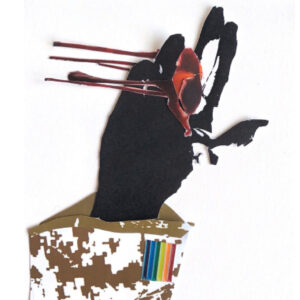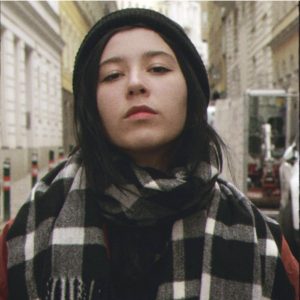Sofiya Tkachenko interviews Ukrainian legal activists Tania Kasian and Maxim Potapovych

August 25, 2023
'Invisible to the Ukrainian legislation' - What it means to be queer in Ukraine
In the summer of 2022, a petition to legalize same-sex marriage in Ukraine was started, partially to support and represent queer people in the Ukrainian Forces.
In response, Ukrainian president Volodymyr Zelenskyy reiterated that while state of emergency conditions are in place it is impossible to amend the Constitution of Ukraine. While this would not be feasible during war, there is an alternative; civil partnerships.
In June 2023, Inna Sovsun, a Ukrainian national representative, submitted the ‘Registered Civil Partnerships Bill’, which would allow members of the LGBTQ+ community to register their relationships and, in turn, be granted certain vital rights.
Such rights are especially important in times of war. According to an estimate by “LGBTMilitary”, an online community of LGBTQ+ members of the military, there are around 50,000 LGBTQ people serving in Ukraine’s military.
This bill has been officially registered in the Supreme Council of Ukraine (Verkhovna Rada Ukrainy). “The state must provide legal protection to those who protect its safety,” Sovsun said in a Facebook post.
I spoke to Maxim Potapovych, a representative of the “Ukrainian LGBTIQ Military For Equal Rights” about the importance of such legal protections.
He raised the issue of the right to information in the case of a partner’s capture, injury, or death. He also mentioned the right for emergency medical decision-making, the right to visit a partner in the ICU, the right to arrange a funeral service in case of death, and to legally inherit belongings.
“As well as these rights, a common occurrence, unfortunately, is that if one of the partners is injured and the other one is the primary caretaker, they are unable to be unemployed and legally take care of them.”

I also contacted Tania Kasian, the executive director of Ukrainian non-governmental organisation “Fulcrum UA” to talk more about the Bill and LGBTQ+ rights in Ukraine in general. She and her team had worked closely with Inna Sovsun in creating the civil partnerships bill.
Kasian spoke to me about the difference between civil marriage and civil partnerships. “Civil marriage is registered at the marriage registry and that is the legal bond that states that you are husband and wife,” she said.
“They have their own set of rights, concerning belongings, alimony, child support and others. If we are talking about same-sex couples, civil marriage is not available to them as an option, they are literally invisible to the Ukrainian Legislation in that sense.”
Meanwhile a civil partnership would make same-sex partners “relatives”, meaning that they’re granted the same rights as their blood relatives ” Kasian told Harbinger’s.
“The focus to this issue has become more powerful, because unlike their brothers and sisters in the army, the rights of LGBQ+ soldiers are not protected. But the ‘Registered Civil Partnerships Bill’ will not only benefit same-sex couples, as people will be able to register opposite-sex relationships as well, which will allow them to have necessary rights in times of war, without entering an official marriage,” Kasian added.
Kasian pointed out that – without access to marriage – if a member of a same-sex couple should die, their partner could have difficulty inheriting from them, even if this is stipulated in their will.
Members of the dead person’s immediate family are able to appeal the will, potentially leaving the surviving member of the couple with nothing.
“They are also not able to collect the body in case of death, and arrange a funeral service,” she added.” But, with the civil partnership bill in place, same-sex couples – as legal relatives – would be granted these rights.
However, not everyone is supportive of the Bill. The representatives of the Orthodox Church of Ukraine have submitted a declaration “about the negative approach to the sin of sodomy (homosexualism), its propaganda in society and the said same-sex marriages.”
The declaration states that in the Bible it is clearly written that same-sex relationships are not acceptable.
In March 2023, the Ukrainian Church and Religious Organisation Council spoke out against the introduction of civil partnerships as “it goes against the family institution and the value system of the Ukrainian society.”
“In Ukraine nobody is against the preaching of any religion. Thus the people, who are not prohibited from preaching their preferred religions, should not prohibit other people from having simple rights,” Kasian commented on this news.
Kasian explained that the word used by the representatives is “homosexualism” and not “homosexuality”. The former of which – with origins in the Soviet Union – implies that being gay is a disease.
“The Church using such terminology in the official papers should already be a red flag,” Kasian said.
This year the European Court of Human Rights ruled that the Ukrainian state violated two Articles of the European Convention of Human Rights.
These include Article 8 (right to respect for private and family life) and Article 14 (prohibition of discrimination), in the case of ‘Maymulakhin and Markiv v. Ukraine’, submitted back in 2014.
The case presented interests of a same-sex couple, Andriy Maymulakhin and his partner Andriy Markiv, concerning the violation of their rights to a family life due to the impossibility of registering the relationship in Ukraine.
Kasian raised the point that, if Ukraine wants to be accepted into the European Union, and continue to receive international support, it’s important that we pass this legislation.
"The main prerogative should not be being accepted to the European Union, but protecting basic human rights of every member of Ukrainian society.”
It’s important to note that the legal status of civil partnerships is not the only issue facing LGBTQ+ people in Ukraine. Kasian raised a few more areas for concern, including the recognition of hate crimes, hate speech, and discrimination on the basis of sexuality and gender identity.
“For example, there is a bill that will supplement the Criminal Code Article 161 and it would recognize the factor of sexuality and gender identity, as a hate crime basis,” Kasian shared.
“Right now, without this supplement, many cases that have an obvious homophobic basis might be just discarded as “disorderly conduct”, which is a much more minor offence than a “hate crime” and more easily manageable, due to it not being a legal basis in the Criminal Code.”.
Potapovych also commented on this Bill; “If the Civil Partnerships Bill will mostly benefit members of the LGBTQ+ community, who are in relationships, the [hate crimes] bill will be beneficial to every member. As the hate crimes on the basis of sexuality are committed a lot, even within the army, unfortunately, and the punishment for such crimes is simply too light, which doesn’t really help to reduce the number of such crimes.”
The question of LGBTQ+ rights in Ukraine is now more important than ever, as lots of these people are defending the country every day, and apart from that, are equally Ukrainian citizens who deserve to be recognized as such.
Any queer Ukrainian should be able to create a family and have the same rights as heterosexual citizens.




